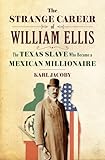The strange career of William Ellis : the Texas slave who became a Mexican millionaire / Karl Jacoby.
Material type: TextPublisher: New York : W.W. Norton & Company, [2016]Copyright date: ©2016Edition: First editionDescription: xxviii, 304 pages, 8 unnumbered pages of plates : illustrations, maps ; 25 cmContent type: text Media type: unmediated Carrier type: volumeISBN: 9780393239256 (hardcover); 039323925X (hardcover)Subject(s): Ellis, William Henry, 1864-1923 | Ellis, William Henry, 1864-1923 | Reconstruction (United States : 1865-1877) | African Americans -- Biography | Slaves -- Texas -- Biography | Businessmen -- Mexico -- Biography | Millionaires -- Mexico -- Biography | Reconstruction (U.S. history, 1865-1877) -- Biography | Passing (Identity) -- United States -- History | African Americans -- Texas -- Politics and government | United States -- Race relations -- History | Mexican-American Border Region -- Biography | African Americans | African Americans -- Politics and government | Businessmen | Millionaires | Passing (Identity) | Race relations | Slaves | Mexico | North America -- Mexican-American Border Region | Texas | United States | Businessmen. -- Mexico -- Biography | African Americans -- Biography | African Americans -- Texas -- Politics and government | HISTORY / African American | HISTORY / United States / 20th Century | SOCIAL SCIENCE / Discrimination & Race Relations | 1865-1877Genre/Form: Biographies. | Biographies. | Biography. | History. | Biographies.DDC classification: 306.3/62092 | B LOC classification: E185.97.E46 | J33 2016Other classification: BIO002000 | HIS056000 | HIS036040 | SOC054000 | SOC031000 | HIS025000
TextPublisher: New York : W.W. Norton & Company, [2016]Copyright date: ©2016Edition: First editionDescription: xxviii, 304 pages, 8 unnumbered pages of plates : illustrations, maps ; 25 cmContent type: text Media type: unmediated Carrier type: volumeISBN: 9780393239256 (hardcover); 039323925X (hardcover)Subject(s): Ellis, William Henry, 1864-1923 | Ellis, William Henry, 1864-1923 | Reconstruction (United States : 1865-1877) | African Americans -- Biography | Slaves -- Texas -- Biography | Businessmen -- Mexico -- Biography | Millionaires -- Mexico -- Biography | Reconstruction (U.S. history, 1865-1877) -- Biography | Passing (Identity) -- United States -- History | African Americans -- Texas -- Politics and government | United States -- Race relations -- History | Mexican-American Border Region -- Biography | African Americans | African Americans -- Politics and government | Businessmen | Millionaires | Passing (Identity) | Race relations | Slaves | Mexico | North America -- Mexican-American Border Region | Texas | United States | Businessmen. -- Mexico -- Biography | African Americans -- Biography | African Americans -- Texas -- Politics and government | HISTORY / African American | HISTORY / United States / 20th Century | SOCIAL SCIENCE / Discrimination & Race Relations | 1865-1877Genre/Form: Biographies. | Biographies. | Biography. | History. | Biographies.DDC classification: 306.3/62092 | B LOC classification: E185.97.E46 | J33 2016Other classification: BIO002000 | HIS056000 | HIS036040 | SOC054000 | SOC031000 | HIS025000 | Item type | Current library | Call number | Copy number | Status | Notes | Date due | Barcode |
|---|---|---|---|---|---|---|---|
 Books
Books
|
Female Library | E185.97.E46 .J33 2016 (Browse shelf (Opens below)) | 1 | Available | STACKS | 51952000327561 | |
 Books
Books
|
Main Library | E185.97.E46 .J33 2016 (Browse shelf (Opens below)) | 1 | Available | STACKS | 51952000327578 |
Includes bibliographical references (pages 257-288) and index.
Prologue: Through history's cracks -- Victoria -- Gone to Texas -- Juneteenth -- San Antonio/Tlahualilo -- Military Plaza -- The land of God and liberty -- Manhattan/Mexico City -- A picturesque figure -- The city of happy homes -- Epilogue: Trickster makes this world -- Afterword.
To his contemporaries in Gilded Age Manhattan, Guillermo Eliseo was a fantastically wealthy Mexican, the proud owner of a luxury apartment overlooking Central Park, a busy Wall Street office, and scores of mines and haciendas in Mexico. But for all his obvious riches and his elegant appearance, Eliseo also possessed a devastating secret: he was not, in fact, from Mexico at all. Rather, he had begun life as a slave named William Ellis, born on a cotton plantation in southern Texas during the waning years of King Cotton. After emancipation, Ellis, capitalizing on the Spanish he learned during his childhood along the Mexican border and his ambivalent appearance, engaged in a virtuoso act of reinvention. He crafted an alter ego, the Mexican Guillermo Eliseo, who was able to access many of the privileges denied to African Americans at the time: traveling in first-class train berths, staying in upscale hotels, and eating in the finest restaurants. The Strange Career of William Ellis reads like a novel but offers fresh insights on the history of the Reconstruction era, the US-Mexico border, and the abiding riddle of race. At a moment when the United States is deepening its connections with Latin America and recognizing that race is more than simply black or white, Ellis's story could not be more timely or important.
1 2

There are no comments on this title.